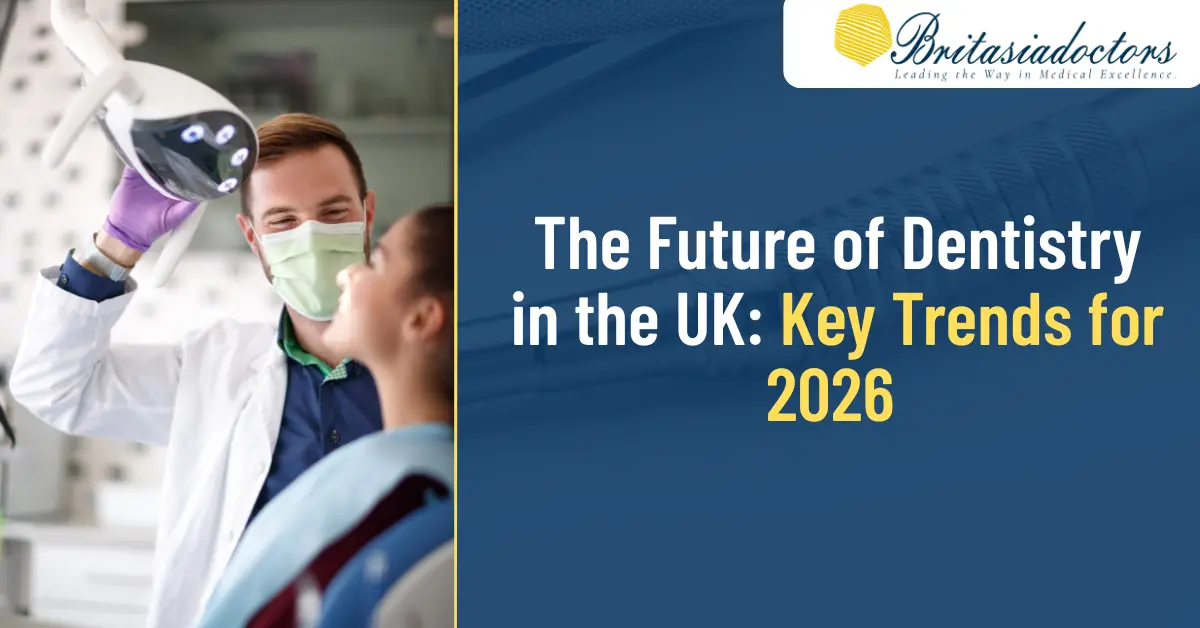
The dental landscape in the United Kingdom is undergoing rapid transformation. As we move through 2025 and into the next decade, dentistry is becoming more digital, preventive, sustainable, and patient-focused. These developments are reshaping how practices operate, how patients engage with care, and what skills dental professionals need to stay ahead.
This guide explores the key trends shaping the future of dentistry in the UK and offers practical insights into how dental professionals can prepare for long-term success in a changing industry.
1. Digital Dentistry Becomes the New Standard
Digital dentistry is one of the most significant shifts in the UK dental sector. The move toward fully digital workflows is improving accuracy, reducing treatment times, and delivering stronger patient outcomes.
Key advancements include:
- 3D Printing: Enables same-day crowns, aligners, splints, dentures, and surgical guides, reducing laboratory costs and delays.
- Intraoral Scanners: Replace traditional impressions with faster, more comfortable, and highly accurate results.
- AI-Powered Diagnostics: Detect caries, bone loss, fractures, and oral cancers earlier than conventional methods.
- Cloud-Based Practice Management: Platforms like Dentally and Software of Excellence streamline records, compliance, communication, and financial management.
Impact on the profession:
These tools enhance precision, speed, and efficiency, enabling predictable outcomes and better patient experiences.
2. Shift Toward Preventive and Patient-Centered Care
Dentistry is moving away from reactive treatments toward comprehensive, prevention-focused care. This evolution reflects both government priorities and patient expectations.
Key drivers include:
- Greater awareness of links between oral and systemic health (e.g., diabetes, heart disease).
- Patients seeking long-term oral wellness over short-term fixes.
- NHS pilot programs introducing outcome-based preventive models.
Practices now incorporate advanced diagnostics, tailored hygiene plans, nutritional guidance, and early-detection programs to help patients maintain lifelong oral health.
3. NHS Dentistry: Reform and Renewal
NHS dentistry continues to face challenges such as high demand, workforce shortages, and outdated contract models. However, ongoing reforms aim to modernize the system.
Anticipated developments include:
- New NHS contracts that reward prevention over volume-based care.
- Expanded roles for dental therapists and hygienists to ease pressure on dentists.
- Increased funding for under-served regions to improve access.
- Greater use of digital records and remote consultations.
Although private dentistry is expanding, NHS care remains vital for equitable access. Long-term sustainability will depend on workforce investment, contract reform, and technology integration.
4. Artificial Intelligence and Automation
AI is revolutionizing diagnosis, workflow efficiency, and patient care across dental practices.
Common AI applications include:
- Radiograph analysis with higher precision.
- Automated scheduling and chatbot triage.
- Predictive analytics for treatment planning.
- AI-assisted orthodontic, implant, and cosmetic planning.
AI will not replace dentists—it will enhance clinical decision-making, reduce administrative burdens, and ensure consistency and quality across services.
5. Sustainability and Eco-Friendly Dentistry
Sustainable dentistry is no longer optional—it’s becoming an ethical and competitive advantage. Patients are increasingly drawn to environmentally responsible clinics.
Current sustainability practices include:
- Biodegradable and recyclable materials replacing single-use plastics.
- Digital workflows cutting down on paper waste and shipping emissions.
- Energy-efficient sterilization and water-saving systems.
- Ethical sourcing and greener procurement policies.
Eco-conscious clinics not only reduce their environmental footprint but also build stronger patient loyalty and brand reputation.
6. Evolving Workforce Dynamics
The UK dental workforce is evolving rapidly, shaping new opportunities for professional growth.
Emerging trends include:
- Portfolio Careers: Many dentists now combine clinical work with research, consulting, aesthetics, or digital health.
- Rising Female Leadership: Women now constitute nearly half the workforce, influencing leadership and innovation.
- Demand for Digital Skills: Competence in 3D scanning, digital design, and software platforms is now essential.
- Focus on Wellbeing: Greater attention to mental health, flexible schedules, and work-life balance.
Dentists who embrace these changes and invest in continual upskilling will thrive in the years ahead.
7. Surge in Cosmetic and Aesthetic Dentistry
Cosmetic dentistry is one of the fastest-growing segments in UK dental care, driven by social media influence, remote work culture, and growing aesthetic awareness.
Popular treatments include:
- Clear aligners
- Teeth whitening
- Composite bonding
- Natural veneers
- Minimally invasive cosmetic procedures
- Facial aesthetics, including Botox and dermal fillers
Patients increasingly prefer subtle, natural-looking results, and practices offering aesthetic solutions consistently report strong patient demand and revenue growth.
8. Teledentistry and Remote Care
Teledentistry has transitioned from a pandemic necessity to a long-term model for accessible care.
Benefits include:
- Remote triage for non-urgent cases
- Quicker follow-up consultations
- Improved access for rural and elderly patients
- Streamlined clinical workflows
- Reduced unnecessary visits
Hybrid practices, blending in-person and digital care, are expected to become the norm by 2030.
9. Challenges Ahead
Despite exciting progress, the dental sector faces several ongoing challenges:
- Persistent NHS workforce shortages
- Rising operational costs
- Visa and regulatory hurdles for overseas dentists
- Balancing technology with empathetic, personalized care
Addressing these challenges requires a strategic balance of innovation, human-centered care, and ethical practice management.
Conclusion
The future of UK dentistry is being shaped by innovation, prevention, sustainability, and an unwavering focus on patient care. As technology continues to evolve, success will belong to dental professionals who remain adaptable, digitally skilled, and empathetic.
Practices that integrate clinical expertise with technological innovation, business awareness, and genuine patient connection will lead the way into the next era of dentistry.




